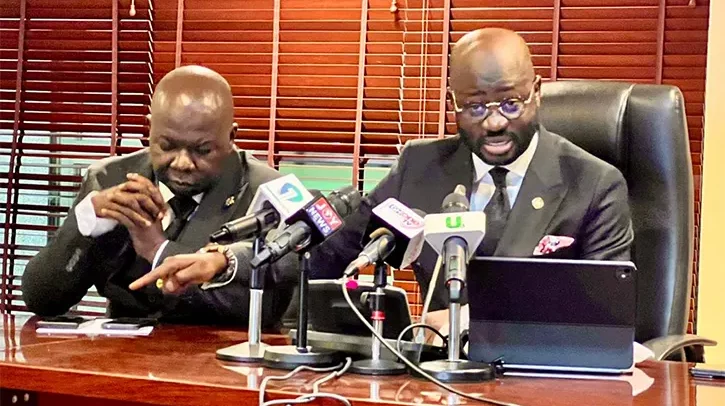Nana Asafo-Adjei Ayeh addressing the media
The Minority in Parliament has expressed grave concern over what it describes as a disturbing deviation from Ghana’s traditionally disciplined and principled diplomatic posture under the current administration.
Speaking at a press briefing in Parliament yesterday, Deputy Ranking Member of the Foreign Affairs Committee, Nana Asafo-Adjei Ayeh, accused the Foreign Affairs Minister, Samuel Okudzeto Ablakwa, of undermining the nation’s longstanding diplomatic credibility through a series of missteps and poor decisions.
Flanked by fellow Minority MPs, Mr. Ayeh stressed that diplomacy in Ghana had historically transcended partisan politics, serving instead as a national trust built on consistency and institutional competence.
“Since independence, Ghana has earned global respect by speaking with a steady and principled voice abroad. Today, that reputation is in jeopardy,” he said.
According to the Minority, the Minister has mismanaged the chip-embedded passport programme, which they described as a legacy project from the previous New Patriotic Party (NPP) administration, fully funded and launched in December 2024.
Mr. Ayeh alleged that the Minister’s decision to stage a “costly and redundant relaunch” in April this year, at a cost of $1.2 million, did not improve service delivery.
He said, instead, it resulted in a massive backlog, with over 32,000 applications unprocessed and 68% of applicants waiting beyond the promised 15-day express service.
He cited official documents, including Contract CEP 2111 and the Passport Office’s June 20 report, noting that the situation has caused significant distress.
“Videos of stranded applicants, including mothers missing scholarship deadlines, have gone viral, with one video reaching over 1.4 million views,” he lamented.
Another major issue raised was the abrupt closure of Ghana’s Embassy in Washington, D.C. on May 26, following an internal directive to investigate a staff-related fraud allegation.
The decision, Mr. Ayeh said, led to the cancellation of 437 scheduled appointments and left dozens stranded, including a woman who missed her grandmother’s funeral due to an unreturned passport.
“Within three days, Ghana lost over $38,200 in expedited fees, and at least 112 travellers missed their flights,” he added.
The Minority also questioned the Minister’s handling of Ghana’s position on the Western Sahara dispute. They criticised what they described as contradictory diplomatic overtures, from endorsing Morocco’s autonomy initiative in a June 5 communique in Rabat to reaffirming support for the Sahara Republic shortly after. The Algerian and Moroccan diplomatic missions in Accra both issued formal responses, illustrating the confusion Ghana’s policy has caused.
“This is not foreign policy. It is confusing. The same NDC that criticised the previous government’s position now embraces it without explanation, raising doubts about strategic judgment and consultation,” Mr. Ayeh stated.
Additionally, the Minority faulted the Foreign Ministry’s delayed response to political unrest in neighbouring Togo, where protests between June 8 and 20 were met with live ammunition and mass arrests.
The Minority asserted that despite reports from Amnesty International and the presence of an estimated 5,000 Ghanaians in Togo, no travel advisory or emergency hotline was issued.
“In 2017, we responded within 14 days to similar events. This time, the Ministry merely claimed it was ‘monitoring’ the situation,” Ayeh said.
The Minority demanded a full public audit of the passport programme, covering costs, supplier contracts, and backlog statistics, within 14 days; a consular report explaining the legal basis and authorisation for the embassy closure in Washington and plans for compensating affected Ghanaians; a detailed policy paper outlining Ghana’s current stance on the Western Sahara, with references to diplomatic briefings and cabinet decisions; and a framework for emergency response in volatile neighbouring countries, including travel advisories, evacuation protocols, and hotlines, starting with Togo.
Parliament, the Minority added, will request the Minister’s urgent appearance before the House to address these concerns.
“Diplomacy is not about headlines or emotional impulse. It demands consistency, consultation, and accountability. We call on all journalists, civil society, and patriotic Ghanaians to demand transparency and protect Ghana’s hard-earned international reputation,” he concluded.
By Ernest Kofi Adu, Parliament House


